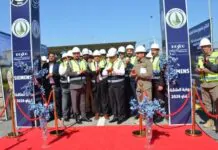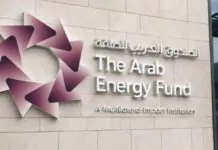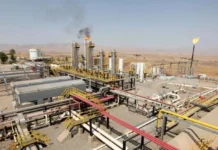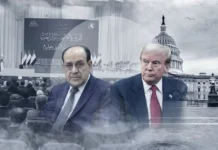Tishwash: Investments 2025: Economic renaissance under the umbrella of the general budget
Mazhar Muhammad Salih, financial and economic advisor to Prime Minister Muhammad Shia al-Sudani, confirmed today, Thursday, that investment projects for the year 2025 are an integral part of the investment section in the Federal General Budget Law.
He added in his statement to {Euphrates News} that “the three-year general budget was enacted to give the development policy sufficient flexibility in implementing investment projects without interruption, according to a flexible and rational vision that takes into account the indicators of the National Development Plan 2024-2028, and according to the available financing capabilities drawn up in the plan and the general budget together.” link
Tishwash: Launching the implementation of the {Fursan} residential city.. and Al-Sudani: Iraq is facing a new industrial renaissance
Prime Minister Mohammed Shia Al-Sudani launched, today, Wednesday, the executive works for the development project of the Al-Fursan residential city in the Al-Nahrawan area in Baghdad, on an area of approximately (24,197) dunums, which includes the allocation of serviced residential lands distributed to members of the Ministry of Defense.
Al-Sudani handed over land ownership deeds to a number of families of martyrs from the armed forces.
Al-Sudani appreciated the efforts of the Ministry of Defense and other ministries supporting the launch of this project, stressing the work to provide serviced residential plots in the rest of the governorates, and directing the generalization of this experience to members of the rest of the other security agencies, indicating that the Knights City project will be implemented by the real estate developer and planned and implemented by the Ministry of Defense, with the support of the Ministry of Construction, Housing, Municipalities and Public Works, with the developer company obligated to implement with full specifications, and construct part of the basic services such as schools, health centers and service departments.
He explained that the project is one of the government’s paths to address the housing crisis, and a model in the governorates to include all members, officers and leaders of the Ministry of Defense, stressing that the government left the issue of distributing residential lands without infrastructure services, or designs that are appropriate for modern cities and various requirements.
Al-Sudani referred to the residential cities that will be implemented for the members of the armed forces, including the Al-Ghazlani City project in Mosul, and another city in Basra, in addition to laying the foundation stone for the 6th of November City in Taji, to cover the needs of housing units for citizens and members of the security services.
The following are the most important points made by the Prime Minister:
– The Ministry of Defense personnel defended the greater homeland, and we must provide them with a small homeland represented by a residential plot of land and decent services.
We have a new city, “City of Roses,” at the level of a new governorate. It was referred to the investor, and we completed the contracts and its design, and implementation began.
– More than 110,000 housing units will be completed in “City of Roses”, which is 3 km away from the “City of Knights” residential project.
There is a 17 km road under construction, linking central Baghdad to the new residential cities and reaching the city of roses.
– Within the Baghdad Metro plan, new residential cities have been linked, and we are in the process of negotiating with international companies to implement this vital project.
The government has taken into consideration the advance planning for the next 30 years regarding the provision of services, means of transportation and a road network.
I renew the call to the private sector and businessmen to proceed with the implementation of housing projects and real estate development in Baghdad and the governorates, and the government will provide all facilities.
We call on the private sector to establish construction materials factories in light of the great urban renaissance in the country, as what is available does not cover the actual need.
The number of housing units in projects signed by the government has exceeded one million units.
The sovereign guarantees provided to the private sector confirm that Iraq is facing a new industrial renaissance for the emergence of national factories that cover the needs of the market.
The government is obligated to provide basic services such as sewage networks, drinking water, electricity, communications, and roads. link
************
Russia: We were about to complete important energy projects in Iraq, but the events of 2004 led to their suspension
Elbrus Kotrashev, the Russian Federation’s ambassador to Iraq, confirmed that the decision to evacuate hundreds of Russian experts from Iraq in 2004 came after Russian teams working in the country were directly exposed to terrorist attacks.
During his interview on the “Qasary Al-Qawl” program with Salam Musafir on RT Arabic, on the occasion of “Diplomats’ Day,” he explained that “these attacks resulted in the martyrdom and injury of a number of experts, including Iraqis, which prompted the Russian authorities to take the decision to evacuate to protect the lives of its citizens.”
“Russian companies were about to complete important projects in Iraq that began before 2003, especially in the energy sector, but the painful security events that occurred in 2004 led to the suspension of these projects and the evacuation of more than 900 Russian experts,” Kotrashev added.
He continued: “After that, there was a long interruption in cooperation due to the turbulent security situation, but we want to continue the work and complete it successfully, especially since we are witnessing the suffering of the Iraqi people due to the scarcity of electricity.”
Despite these challenges, the Russian ambassador stressed that relations between Baghdad and Moscow, which date back 80 years, are still strong and distinctive at all levels, describing them as going through their most beautiful stages in terms of the level and strength of cooperation. He pointed out that cooperation between the two countries covers multiple fields, including energy, education and culture.
Regarding cultural exchange, Kotrashev expressed Moscow’s desire to open a Russian cultural center in Iraq, as it was during the Soviet era, explaining that the delay in this step is due to logistical reasons, not political or economic. He also spoke about educational cooperation between the two countries, noting that the number of Iraqi students in Russian universities ranges between 2,500 and 4,000 students.
Regarding cooperation in the energy sector, the ambassador pointed out that Russian investments in the Iraqi oil and gas sector amount to about $20 billion, and may be more. He stressed that Russia leads oil investments in Iraq, surpassing the United States and China, expressing his optimism about the possibility of expanding these investments in the future.
Regarding the possibility of a visit by a senior Russian official or President Putin to Iraq, Kotrashev said: “I hope the visit will be great, and I expect a warm welcome from the Iraqi government and people, but I do not know if it will happen soon because the president is busy with domestic and international issues.” link






